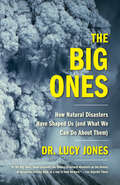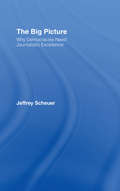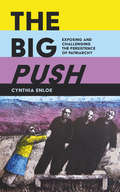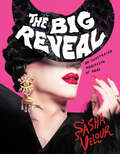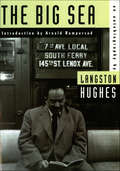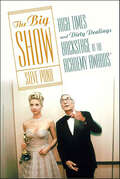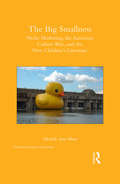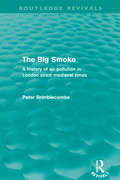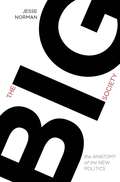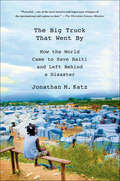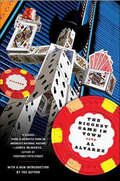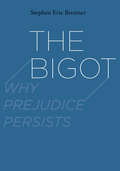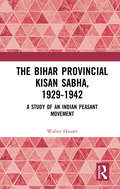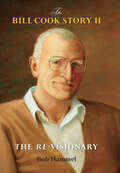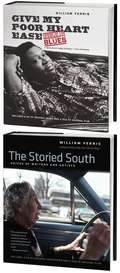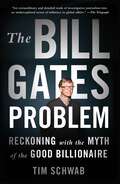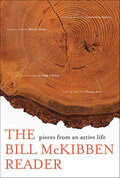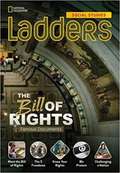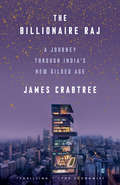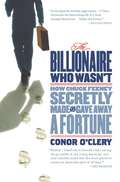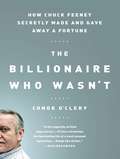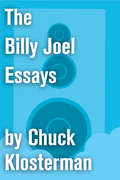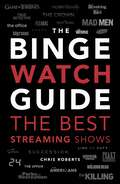- Table View
- List View
The Big No (21st Century Studies)
by Kennan FergusonWhat it means to celebrate the potential and the power of no What does it mean to refuse? To not participate, to not build a better world, to not come up with a plan? To just say &“no&”? Against the ubiquitous demands for positive solutions, action-oriented policies, and optimistic compromises, The Big No refuses to play. Here leading scholars traverse the wide range of political action when &“no&” is in the picture, analyzing topics such as collective action, antisocialism, empirical science, the negative and the affirmative in Deleuze and Derrida, the &“real&” and the &“clone,&” Native sovereignty, and Afropessimism.In his introduction, Kennan Ferguson sums up the concept of the &“Big No,&” arguing for its political importance. Whatever its form—he identifies various strains—the Big No offers power against systems of oppression. Joshua Clover argues for the importance of Marx and Fanon in understanding how people are alienated and subjugated. Theodore Martin explores the attractions of antisociality in literature and life, citing such novelists as Patricia Highsmith and Richard Wright. François Laruelle differentiates nonphilosophy from other forms of French critical theory. Katerina Kolozova applies this insight to the nature of reality itself, arguing that the confusion of thought and reality leads to manipulation, automation, and alienation. Using poetry and autobiography, Frank Wilderson shows how Black people—their bodies and being—are displaced in politics, replaced and erased by the subjectivities of violence, suffering, and absence. Andrew Culp connects these themes of negativity, comparing and contrasting the refusals of antiphilosophy and Afropessimism. Thinking critically usually demands alternatives: how would you fix things? But, as The Big No shows, being absolutely critical—declining the demands of world-building—is one necessary response to wrong, to evil. It serves as a powerful reminder that the presumption of political action is always positive.Contributors: Joshua Clover, U of California Davis and U of Copenhagen; Andrew Culp, California Institute of the Arts; Katerina Kolozova, Institute of Social Sciences and Humanities Skopje; Theodore Martin, U of California, Irvine; Anthony Paul Smith, La Salle U; Frank B. Wilderson III, U of California, Irvine.
The Big Ones: How Natural Disasters Have Shaped Us (and What We Can Do About Them)
by Lucy JonesBy the world-renowned seismologist, a riveting history of natural disasters, their impact on our culture, and new ways of thinking about the ones to comeEarthquakes, floods, tsunamis, hurricanes, volcanoes--they stem from the same forces that give our planet life. Earthquakes give us natural springs; volcanoes produce fertile soil. It is only when these forces exceed our ability to withstand them that they become disasters. Together they have shaped our cities and their architecture; elevated leaders and toppled governments; influenced the way we think, feel, fight, unite, and pray. The history of natural disasters is a history of ourselves.In The Big Ones, leading seismologist Dr. Lucy Jones offers a bracing look at some of the world's greatest natural disasters, whose reverberations we continue to feel today. At Pompeii, Jones explores how a volcanic eruption in the first century AD challenged prevailing views of religion. She examines the California floods of 1862 and the limits of human memory. And she probes more recent events--such as the Indian Ocean tsunami of 2004 and the American hurricanes of 2017--to illustrate the potential for globalization to humanize and heal.With population in hazardous regions growing and temperatures around the world rising, the impacts of natural disasters are greater than ever before. The Big Ones is more than just a work of history or science; it is a call to action. Natural hazards are inevitable; human catastrophes are not. With this energizing and exhaustively researched book, Dr. Jones offers a look at our past, readying us to face down the Big Ones in our future.
The Big Picture: Why Democracies Need Journalistic Excellence
by Jeffrey ScheuerFreedom of the press is the cornerstone of democracy. But, as countless recent examples of lapsed standards in the press since the Jayson Blair affair have shown, the First Amendment is no guarantee that American journalism will be first-rate. A press in crisis is a democracy endangered, argues Jeffrey Scheuer--cultural critic and author of The Sound Bite Society. In his new book, The Big Picture, Scheuer argues that in order for a democracy to thrive it is not enough for its press simply to be free--the press must be exceptional. This book explores journalistic excellence and its essential relationship with democracy, explaining why democracies depend on it and are only as good as their journalism. In The Big Picture, Scheuer explores journalistic excellence from three broad perspectives. First, from the democratic perspective, he shows how journalism is a core democratic function, and journalistic excellence a core democratic value. Then, from an intellectual perspective, he explores the ways in which journalism addresses basic concepts of truth, knowledge, objectivity, and ideology. Finally, from an institutional perspective, he considers the role and possible future of journalism education, the importance of journalistic independence, and the potential for nonprofit journalism to meet the journalistic needs of a democratic society. In lucid and accessible prose, The Big Picture provocatively demonstrates why we must all be vigilant about the quality of journalism today.
The Big Push: Exposing and Challenging the Persistence of Patriarchy
by Cynthia EnloeFor over a century and in scores of countries, patriarchal presumptions and practices have been challenged by women and their male allies. “Sexual harassment” has entered common parlance; police departments are equipped with rape kits; more than half of the national legislators in Bolivia and Rwanda are women; and a woman candidate won the plurality of the popular votes in the 2016 United States presidential election. But have we really reached equality and overthrown a patriarchal point of view? The Big Push exposes how patriarchal ideas and relationships continue to be modernized to this day. Through contemporary cases and reports, renowned political scientist Cynthia Enloe exposes the workings of everyday patriarchy—in how Syrian women civil society activists have been excluded from international peace negotiations; how sexual harassment became institutionally accepted within major news organizations; or in how the UN Secretary General’s post has remained a masculine domain. Enloe then lays out strategies and skills for challenging patriarchal attitudes and operations. Encouraging self-reflection, she guides us in the discomforting curiosity of reviewing our own personal complicity in sustaining patriarchy in order to withdraw our own support for it. Timely and globally conscious, The Big Push is a call for feminist self-reflection and strategic action with a belief that exposure complements resistance.
The Big Reveal: An Illustrated Manifesto of Drag
by Sasha Velour“Drag embodies the queer possibility that exists within each of us—the infinite ways in which gender, good taste, and art can be lived.” –Sasha VelourThis book is a quilt, piecing together memoir, history, and theory into a living portrait of an artist and an art. Within these pages, illustrated throughout with photos and original artwork, Sasha Velour illuminates drag as a unique form of expression with a rich history and a revolutionary spirit.Each chapter strips off a new layer, removing one tantalizing glove and then another, to reveal all the twists and turns in the life of a queen. As Sasha recalls her own journey, from the women who raised her, to learning the craft of an artist, to success, disaster, and more, she also uncovers the history of queer life around the world that made it all possible.From shamans to “fairies balls,” empresses to RuPaul’s Drag Race (and beyond), The Big Reveal chronicles and celebrates our shared queer pasts. “If we want to be seen as legendary,” writes Sasha, “we have to weave ourselves into history.”From an iconoclastic drag queen comes an equally singular, thought-provoking manifesto that brings necessary and sparkling substance to our understanding of drag, queerness, beauty, and liberation!
The Big Sea: An Autobiography (American Century)
by Langston HughesIntroduction by Arnold Rampersad.Langston Hughes, born in 1902, came of age early in the 1920s. In The Big Sea he recounts those memorable years in the two great playgrounds of the decade--Harlem and Paris. In Paris he was a cook and waiter in nightclubs. He knew the musicians and dancers, the drunks and dope fiends. In Harlem he was a rising young poet--at the center of the "Harlem Renaissance."Arnold Rampersad writes in his incisive new introduction to The Big Sea, an American classic: "This is American writing at its best--simpler than Hemingway; as simple and direct as that of another Missouri-born writer...Mark Twain."
The Big Show: High Times and Dirty Dealings Backstage at the Academy Awards
by Steve PondAn unprecedented look at the machinations behind everyone's favorite Hollywood circus and what it reveals about the business of moviemaking.Oscar parties. Oscar pools. Oscar style. Oscar predictions. The Oscars breed their own peculiar mania and a billion people worldwide are alleged to watch the broadcast every year. While that figure may be the Academy's big white lie, the Oscars draw a viewership well into the hundreds of millions--a tremendous audience for what is essentially a television program. But this is no ordinary show. Love it or loathe it, the Oscars are an irresistible spectacle: a gloriously gaudy, glitzy, momentous, and foolish window into the unholy alliance of art and commerce that is the film industry. The Oscar statuette is a totem of such potency that millions are spent and careers laid on the line in the reckless pursuit of an eight-pound chunk of gold-plated britannium. The Big Show is a chronicle of the past fifteen years of the Academy Awards, the most tumultuous decade in Oscar's seventy-six year history. Written by the only journalist ever given carte blanche access to the planning, production, and backstage intrigue of the Oscars, it offers an unguarded, behind-the-scenes glimpse of this singular event, along with remarkable insight into how the Oscars reflect the high-stakes politics of Hollywood, our obsession with celebrities (not to mention celebrities' obsession with themselves), and the cinematic state of the union.
The Big Smallness: Niche Marketing, the American Culture Wars, and the New Children’s Literature (Children's Literature and Culture)
by Michelle Ann AbateThis book is the first full-length critical study to explore the rapidly growing cadre of amateur-authored, independently-published, and niche-market picture books that have been released during the opening decades of the twenty-first century. Emerging from a powerful combination of the ease and affordability of desktop publishing software; the promotional, marketing, and distribution possibilities allowed by the Internet; and the tremendous national divisiveness over contentious socio-political issues, these texts embody a shift in how narratives for young people are being creatively conceived, materially constructed, and socially consumed in the United States. Abate explores how titles such as My Parents Open Carry (about gun laws), It’s Just a Plant (about marijuana policy), and My Beautiful Mommy (about the plastic surgery industry) occupy important battle stations in ongoing partisan conflicts, while they are simultaneously changing the landscape of American children’s literature. The book demonstrates how texts like Little Zizi and Me Tarzan, You Jane mark the advent of not simply a new commercial strategy in texts for young readers; they embody a paradigm shift in the way that narratives are being conceived, constructed, and consumed. Niche market picture books can be seen as a telling barometer about public perceptions concerning children and the social construction of childhood, as well as the function of narratives for young readers in the twenty-first century. At the same time, these texts reveal compelling new insights about the complex interaction among American print culture, children’s reading practices, and consumer capitalism. Amateur-authored, self-published, and specialty-subject titles reveal the way in which children, childhood, and children’s literature are both highly political and heavily politicized in the United States. The book will be of interest to scholars and students in the fields of American Studies, children’s literature, childhood studies, popular culture, political science, microeconomics, psychology, advertising, book history, education, and gender studies.
The Big Smoke: A History of Air Pollution in London since Medieval Times (Routledge Revivals)
by Peter BrimblecombeFirst published in 1987, Peter Brimblecombe's book provides an engaging historical account of air pollution in London, offering a fascinating insight into the development of air pollution controls against a changing social and economic background. He examines domestic and industrial pollution and their effects on fashions, furnishings, buildings and human health. The book ends with an intriguing analysis of the dangers arising from contemporary pollutants and a glimpse of what the future may hold for London.
The Big Society: The Anatomy Of The New Politics
by Jesse NormanNEW BOOK ARGUES THAT THE BIG SOCIETY WILL REDEFINE BRITISH POLITICS FOR A GENERATIONYou can call it liberalism. You can call it empowerment. You can call it freedom. You can call it responsibility. I call it the Big Society. The Big Society: the Anatomy of the New Politics, the first book to analyse and explain this influential new idea, shows how the Big Society will redefine British politics for a generation. Ranging widely over economics, philosophy, history, business, civil liberties, education and culture, it reveals how the Big Society is rooted in neglected British intellectual and social traditions but also embodies some of the most unexpected and cutting-edge new policy ideas. Packed with deep insights and new perspectives, this book tells you everything you need to know about the most exciting idea in British politics. It is essential reading for politicians, economists, social commentators, those in the public services and the voting public. Among other things, it explains -- how the growth of the Labour party has been a disaster for the Left in Britain -- why so much "happiness theory" is intellectually bankrupt -- the paradox of creativity: why high bonuses often reduce, not improve, human performance -- why Conservatives should robustly defend common law human rights -- the social power of music and the arts. Published by the University of Buckingham Press, it is available online and in all good bookshops. A sample chapter can be found on www.jesse4hereford.com.Praise for the author's Compassionate Conservatism (2006): "The intellectual guidebook to Cameronism", Sunday Times, "The book everyone in Westminster is talking about", The Observer, "Superb...What the Conservatives need now is not re-branding but an actual philosophical and policy basis for action. This book brilliantly provides that basis", Andrew Sullivan, political commentator and journalist, "Politicians should encourage the emergence of voluntary co-operation, exchange and virtue in society. This delightful and important book explains why and how, from political first principles to policy nuts and bolts. Conservatives and non-conservatives alike should read it", Matt Ridley, author of The Rational Optimist, "A glimpse of the future of British Conservatism", Adrian Wooldridge, co-author of The Right Nation.
The Big Truck That Went By: How the World Came to Save Haiti and Left Behind a Disaster
by Jonathan M. KatzOn January 12, 2010, the deadliest earthquake in the history of the Western Hemisphere struck the nation least prepared to handle it. Jonathan M. Katz, the only full-time American news correspondent in Haiti, was inside his house when it buckled along with hundreds of thousands of others. In this visceral, authoritative first-hand account, Katz chronicles the terror of that day, the devastation visited on ordinary Haitians, and how the world reacted to a nation in need. More than half of American adults gave money for Haiti, part of a monumental response totaling $16.3 billion in pledges. But three years later the relief effort has foundered. It's most basic promises—to build safer housing for the homeless, alleviate severe poverty, and strengthen Haiti to face future disasters—remain unfulfilled.The Big Truck That Went By presents a sharp critique of international aid that defies today's conventional wisdom; that the way wealthy countries give aid makes poor countries seem irredeemably hopeless, while trapping millions in cycles of privation and catastrophe. Katz follows the money to uncover startling truths about how good intentions go wrong, and what can be done to make aid "smarter."With coverage of Bill Clinton, who came to help lead the reconstruction; movie-star aid worker Sean Penn; Wyclef Jean; Haiti's leaders and people alike, Katz weaves a complex, darkly funny, and unexpected portrait of one of the world's most fascinating countries. The Big Truck That Went By is not only a definitive account of Haiti's earthquake, but of the world we live in today.
The Biggest Game in Town
by Al Alvarez“The greatest dissection of high-stakes Vegas poker and the madness that surrounds it ever written.” —TimeOutAl Alvarez touched down in Las Vegas one hot day in 1981, a dedicated amateur poker player but a stranger to the town and its crazy ways. For three mesmerizing weeks he witnessed some of the monster high-stakes games that could only have happened in Vegas and talked to the extraordinary characters who dominated them—road gamblers and local professionals who won and lost fortunes on a regular basis.Set over the course of one tournament, The Biggest Game in Town is both the first chronicle of the World Series of Poker ever written and a portrait of the hustlers, madmen, and geniuses who ruled the high-stakes game in America. It is a brilliant insight into poker’s appeal as a hobby, an addiction, and a way of life, and into the skewed psychology of master players and fearless gamblers. With a new introduction by the author, Alvarez’s classic account is “probably the best book on poker ever written” (The Evening Standard).“A classic . . . There is no better book on America’s national pastime.” —James McManus, New York Times–bestselling author of Positively Fifth Street“Magnificent . . . Beyond the straights and full houses, Alvarez has written a book about people who are extremely good at what they do, and about America.” —San Francisco Chronicle“Conveys an understanding of gamblers and their milieu that can appeal to someone who has never seen a casino.” —Philadelphia Inquirer“Thoroughly entertaining . . . both perceptive and literate.” —The Washington Post
The Bigot
by Stephen Eric BronnerStephen Eric Bronner is a prolific author, activist, and one of America's leading political thinkers. His new book presents bigotry as a systematic, all-encompassing mindset that has a special affinity for right-wing movements. In what will surely prove a seminal study, Bronner explores its appeal, the self-image it justifies, the interests it serves, and its complex connection with modernity. He reveals how prejudice shapes the conspiratorial and paranoid worldview of the true believer, the elitist, and the chauvinist. In the process, it becomes apparent how the bigot hides behind mainstream conservative labels in order to support policies designed to disadvantage the targets of his contempt. Examining bigotry in its various dimensions--anthropological, historical, psychological, sociological, and political--Professor Bronner illustrates how the bigot's intense hatred of "the other" is a direct reaction to social progress, liberal values, secularism, and an increasingly complex and diverse world. A sobering look at the bigot in the twenty-first century, this volume is essential for making sense of the dangers facing democracy now and in the future.
The Bihar Provincial Kisan Sabha, 1929-1942: A Study of an Indian Peasant Movement
by Walter HauserOn December 5th, 1920, in Patna, the Dasnami sannyasi Sahajanand Saraswati encountered Mahatma Gandhi for the first time. Sahajanand was already known in social-reform circles in Bihar as an energetic activist and educator working to promote Bhumihar Brahman identity. Inspired by the Mahatma’s radical reformulation of Indian nationalism, ‘the Swami’ (as Sahajanand would soon come to be known) threw himself into nationalist politics and the Indian National Congress. Within a decade, moved by the plight of tenant-farmers struggling against excessive rent demands and abusive landlord ‘exactions’, the Swami had spearheaded the formation of the Bihar Provincial Kisan Sabha. This organization quickly became the largest organization of its kind in India, catapulting the Swami onto the national stage. By the early mid-1930s the Swami had publicly broken with both the Mahatma and the ‘Gandhians’ and had made common cause with the left wing of the Congress. Later, as the storm clouds of World War II gathered on the horizon, he joined forces with the Forward Bloc and the Communist Party of India. By the time of his death in 1950, the Swami, disillusioned with politics, had dissociated himself from all parties.This pioneering 1961 study by Walter Hauser, tracks the history of the Bihar peasant movement as it both influenced and was buffeted by national and international politics. Hauser offers here a penetrating analysis of the character of the movement and the mind of its leader as he grappled with and gravitated toward Marxism-Leninism in the 1930s and 1940s. Initially written as a Ph.D. dissertation at the University of Chicago, Hauser’s path-breaking Bihar Provincial Kisan Sabha, 1929-1942 is now being published in its entirety for the first time. The volume includes a ‘Foreword’ by one of Hauser’s many students, William R. Pinch. Please note: Taylor & Francis does not sell or distribute the Hardback in India, Pakistan, Nepal, Bhutan, Bangladesh and Sri Lanka
The Bill Cook Story II: The Re-Visionary
by Bob HammelA look into the final years of the billionaire entrepreneur and philanthropist and his work in historic preservation in Indiana.Working from the spare bedroom of his Bloomington, Indiana, apartment in 1963 with a $1,500 investment, Bill Cook began to construct the wire guides, needles, and catheters that would become the foundation of the global multi-billion-dollar Cook Group. This story has been eloquently told in Bob Hammel’s The Bill Cook Story: Ready, Fire, Aim. The sequel to this story explores Cook’s final years, when the restoration work he championed, epitomized by the spectacular West Baden Hotel, became a driving force in his life and a source of great satisfaction and pleasure. Hammel takes us behind the scenes on the important restorations of Beck’s Mill, a Methodist Church that is now Indiana Landmarks Center, and the remarkable commitment of Cook toward reviving his hometown, Canton, Illinois. At the heart of the book are the events of Bill Cook’s final days and his death in April, 2011, but this solemn chronicle soon gives way to fond recollections of Cook’s extraordinary life and legacy, and to the continuing saga of the company he founded as it looks toward a bright future.“In The Bill Cook Story II: The Re-Visionary, Bob Hammel engagingly highlights several of Cook’s major restoration efforts, and also chronicles how he remained dedicated to such work even as his health failed.” —Indiana Magazine of History
The Bill Ferris Enhanced Omnibus E-Book
by William FerrisThis Omnibus Ebook for the first time brings together pioneering folklorist William Ferris's books on the music and arts of the South.Included in this ebook are:Give My Poor Heart Ease: Voices of the Mississippi Blues:Throughout the 1960s and 1970s, Ferris toured his home state of Mississippi, documenting the voices of African Americans as they spoke about and performed the diverse musical traditions that form the authentic roots of the blues. Now, Give My Poor Heart Ease puts front and center a searing selection of the artistically and emotionally rich voices from this invaluable documentary record. Illustrated with Ferris's photographs of the musicians and their communities and including original music and original film, the book features more than twenty interviews relating frank, dramatic, and engaging narratives about black life and blues music in the heart of the American South.The enhanced ebook edition includes: * Almost 2 hours of video clips and interviews scattered throughout the text* An hour of original music, also imbedded throughout the text* Concludes with the full DVD of original film and full CD of original musicThe Storied South: Voices of Writers and Artists:The Storied South features the voices--by turn searching and honest, coy and scathing--of twenty-six of the most luminous artists and thinkers in the American cultural firmament, from Eudora Welty, Pete Seeger, and Alice Walker to William Eggleston, Bobby Rush, and C. Vann Woodward. Masterfully drawn from one-on-one interviews conducted by Ferris over the past forty years, the book reveals how storytelling is viscerally tied to southern identity and how the work of these southern or southern-inspired creators has shaped the way Americans think and talk about the South.The enhanced ebook edition includes 45 of Ferris's striking photographic portraits of the speakers and original audio and films of the interviews.
The Bill Gates Problem: Reckoning with the Myth of the Good Billionaire
by Tim SchwabNew York Times Editors' ChoiceA powerful investigation of Bill Gates and the Gates Foundation, showing how he uses philanthropy to exercise enormous political power without accountabilityThrough his vaunted philanthropy, Bill Gates transformed himself from a tech villain into one of the most admired people on the planet. Even as divorce proceedings and allegations of misconduct have recently tarnished his public image, the beneficence of the Gates Foundation, celebrated for spending billions to save lives around the globe, is taken as a given. But as Tim Schwab shows in this fearless investigation, Gates is still exactly who he was at Microsoft: a bully and monopolist, convinced of his own righteousness and intent on imposing his ideas, his solutions, and his leadership on everyone else. At the core, he is not a selfless philanthropist but a power broker, a clever engineer who has innovated a way to turn extreme wealth into immense political influence—and who has made us believe we should applaud his acquisition of power, not challenge it. Piercing the blinding halo that has for too long shielded the world’s most powerful (and most secretive) charitable organization from public scrutiny, The Bill Gates Problem shows how Gates’s billions have purchased a stunning level of control over public policy, private markets, scientific research, and the news media. Whether he is pushing new educational standards in America, health reforms in India, global vaccine policy during the pandemic, or Western industrialized agriculture throughout Africa, Gates’s heady social experimentation has shown itself to be not only undemocratic, but also ineffective. In many places, Bill Gates is hurting the very people he intends to help. No less than dark-money campaign contributions or big-business political lobbying, Bill Gates’s philanthropic empire needs to be seen as a problem of money in politics. It is a dangerous model of unconstrained power that threatens democracy and demands our attention.
The Bill McKibben Reader: Pieces from an Active Life
by Bill McKibbenPowerful, impassioned essays on living and being in the world, from the bestselling author of The End of Nature and Deep EconomyFor a generation, Bill McKibben has been among America's most impassioned and beloved writers on our relationship to our world and our environment. His groundbreaking book on climate change, The End of Nature, is considered "as important as Rachel Carson's classic Silent Spring"* and Deep Economy, his "deeply thoughtful and mind-expanding"** exploration of globalization, helped awaken and fuel a movement to restore local economies.Now, for the first time, the best of McKibben's essays—fiery, magical, and infused with his uniquely soulful investigations of modern life—are collected in a single volume, The Bill McKibben Reader. Whether meditating on today's golden age in radio, the natural place of biting black flies in our lives, or the patriotism of a grandmother fighting to get corporate money out of politics, McKibben inspires us to become better caretakers of the Earth—and of one another.*The Plain Dealer (Cleveland )**Michael Pollan
The Bill of Rights: Famous Documents [On-Level] (Ladders Social Studies 5)
by Anne Goudvis Andrew MilsonNIMAC-sourced textbook <P><P>Articles for the National Geographic Famous Documents Series. Articles include The Five Freedoms, Know Your Rights and We Protest
The Billionaire Raj: A Journey Through India's New Gilded Age
by James CrabtreeA colorful and revealing portrait of the rise of India’s new billionaire class in a radically unequal society India is the world’s largest democracy, with more than one billion people and an economy expanding faster than China’s. But the rewards of this growth have been far from evenly shared, and the country’s top 1% now own nearly 60% of its wealth. In megacities like Mumbai, where half the population live in slums, the extraordinary riches of India’s new dynasties echo the Vanderbilts and Rockefellers of yesterday, funneling profits from huge conglomerates into lifestyles of conspicuous consumption. James Crabtree’s The Billionaire Raj takes readers on a personal journey to meet these reclusive billionaires, fugitive tycoons, and shadowy political power brokers. From the sky terrace of the world’s most expensive home to impoverished villages and mass political rallies, Crabtree dramatizes the battle between crony capitalists and economic reformers, revealing a tense struggle between equality and privilege playing out against a combustible backdrop of aspiration, class, and caste. The Billionaire Raj is a vivid account of a divided society on the cusp of transformation—and a struggle that will shape not just India’s future, but the world’s.
The Billionaire Who Wasn't
by Conor O'CleryChuck Feeney was born in Elizabeth, New Jersey, to a blue-collar Irish-American family during the Depression. After service in the Korean War, he made a fortune as founder of Duty Free Shoppers, the world's largest duty-free retail chain. By 1988, he was hailed by Forbes Magazine as the twenty-fourth richest American alive. But secretly Feeney had already transferred all his wealth to his foundation, Atlantic Philanthropies. Only in 1997 when he sold his duty free interests, was he "outed" as one of the greatest and most mysterious American philanthropists in modern times. After going "underground" again, he emerged in 2005 to cooperate on a biography promoting giving while living. Now in his mid-seventies, Feeney is determined his foundation should spend down the remaining $4 billion in his lifetime.
The Billionaire Who Wasn't: How Chuck Feeney Secretly Made and Gave Away a Fortune
by Conor O'CleryChuck Feeney was born in Elizabeth, New Jersey, to a blue-collar Irish-American family during the Depression. After service in the Korean War, he made a fortune as founder of Duty Free Shoppers, the world’s largest duty-free retail chain. By 1988, he was hailed by Forbes Magazine as the twenty-fourth richest American alive. But secretly Feeney had already transferred all his wealth to his foundation, Atlantic Philanthropies. Only in 1997 when he sold his duty free interests, was he “outed” as one of the greatest and most mysterious American philanthropists in modern times. After going “underground” again, he emerged in 2005 to cooperate on a biography promoting giving while living. Now in his mid-seventies, Feeney is determined his foundation should spend down the remaining $4 billion in his lifetime.
The Billionaire Who Wasn't: How Chuck Feeney Secretly Made and Gave Away a Fortune
by Conor O'CleryChuck Feeney was born in Elizabeth, New Jersey, to a blue-collar Irish-American family during the Depression. After service in the Korean War, he made a fortune as founder of Duty Free Shoppers, the world's largest duty-free retail chain. By 1988, he was hailed by Forbes Magazine as the twenty-fourth richest American alive. But secretly Feeney had already transferred all his wealth to his foundation, Atlantic Philanthropies. Only in 1997 when he sold his duty free interests, was he "outed" as one of the greatest and most mysterious American philanthropists in modern times. After going "underground" again, he emerged in 2005 to cooperate on a biography promoting giving while living. Now in his mid-seventies, Feeney is determined his foundation should spend down the remaining $4 billion in his lifetime.
The Billy Joel Essays
by Chuck KlostermanOriginally collected in Sex, Drugs, and Cocoa Puffs and Chuck Klosterman IV, and now available both as a stand-alone essay and in the ebook collection Chuck Klosterman on Pop, these essays are about Billy Joel.
The Binge Watch Guide: The best television and streaming shows reviewed
by Chris RobertsThe 100 best streaming shows reviewed and rated. You may have viewing time on your hands – this guide will give you ideas for what to watch next, with reviews of more than 100 of the best shows around, from the BBC, ITV, C4, HBO, Amazon Prime, Sky Atlantic, Netflix, Disney+ and more.From The Affair to The X-Files, Fawlty Towers to Fleabag, Parks and Recreation to Peaky Blinders and from Game of Thrones to The Crown.

